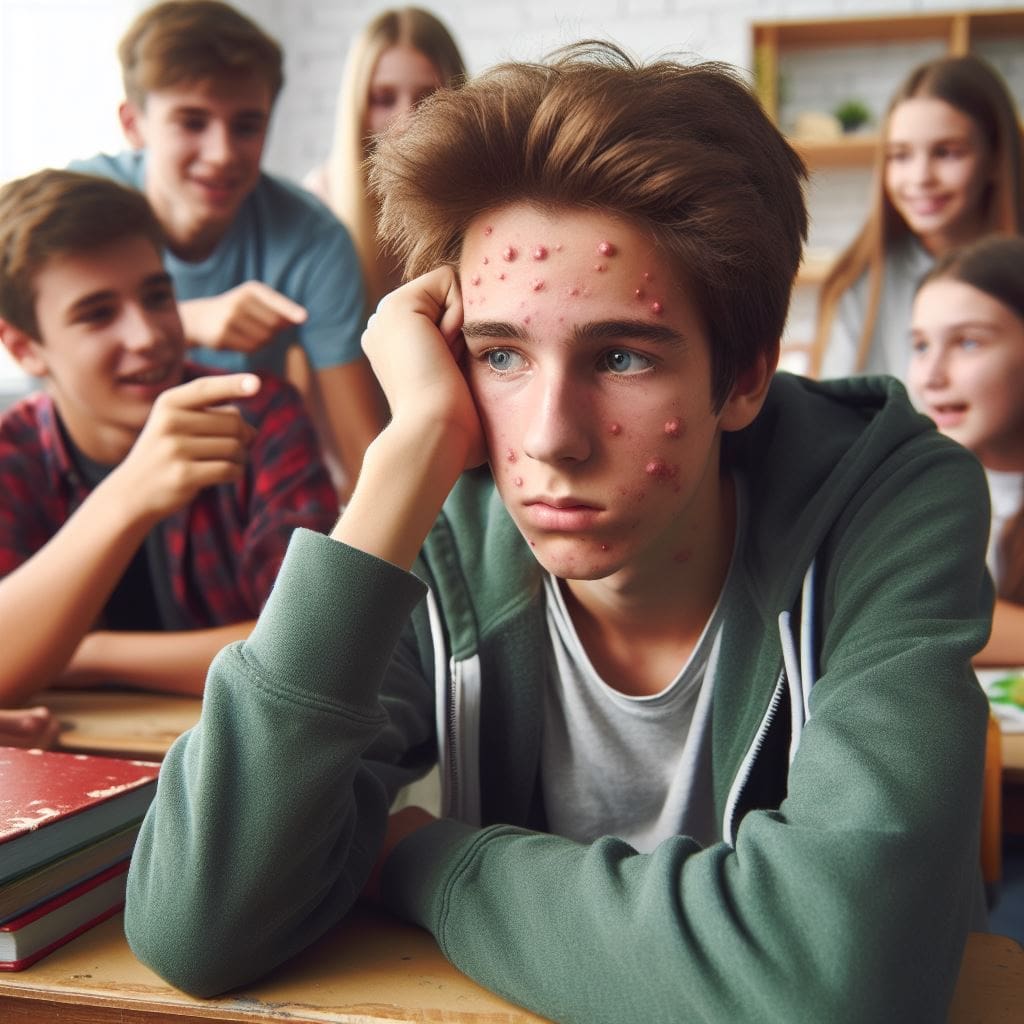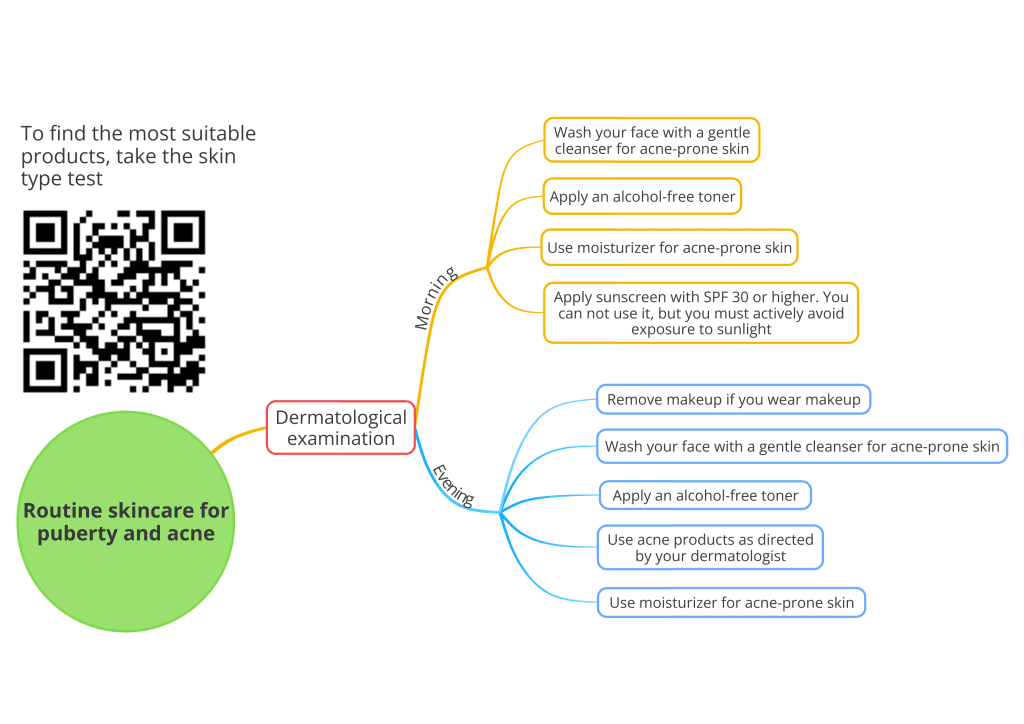Walking around skin care subreddits, I often come across young people looking for help from the community to solve dermatological problems such as eczema, acne, freckles, or acne caused by hormonal changes. . Sadly, many young people choose the wrong skin care methods or products, leading to pitted scars at the age of 20.
Advice from online forums is often highly risky. So why do young people seek help from the community? The main reason is that medical costs in Europe and America are much higher than in Asia, making it difficult for young people to access professional skin care services. Therefore, asking others becomes the fastest and most economical solution.
The questions from young people are very diverse, but the common point is a lack of basic knowledge about skin and how to care for it. One of the most common questions is: Should I do skincare during puberty?
Taking care of our skin from the time we enter puberty or when we first enter our twenties is a way to improve our quality of life and show respect for ourselves.
I. Start a skincare routine early in life
You should take care of your skin when you are young, preferably during puberty. I am completely confident in affirming this. Medicine has long considered acne, freckles, or worse, eczema and psoriasis (keratodermatitis) as diseases, and it is best to prevent them early.
If you are lucky enough not to have any dermatological diseases, the appearance of freckles, melasma, and aging will also appear with age. And skincare at a young age is meant to prevent and minimize those symptoms.
Skincare, right from puberty or when we are 20 years old, has the biggest purpose of improving the quality of life and is an expression of self-respect.
Benefits of skin care at a young age:
• Prevent dermatological diseases.
• Keep skin naturally healthy.
• Prevent premature skin aging; keep skin youthful longer.
In the 1990s, Asian society often did not expose teenagers to the concepts of physical beauty and skin care early. Asian culture in general and the East Asian region in particular believe that this is not appropriate for school age and is a sign of moral and cognitive decline (it is possible that previous generations confused makeup with skincare; that’s why we have such prejudices). However, in the West, dermatological research on adolescents has been carried out early to help increase knowledge, treat, and prevent skin problems.
Quite a few studies show1:
• Acne is the most common skin disease (80–90%) in European adolescents.
• The highest incidence is in 15 to 17 year-olds.
• Men tend to have more severe acne than women.
• Acne can affect adolescents’ quality of life2.
So exactly how serious are the harmful effects of dermatological diseases and acne that we advise you to take care of and skincare from a young age? The following section will clarify those harmful effects.

II. Harmful effects of dermatological diseases on adolescents:
Dermatological diseases, typically acne, cause many inconveniences and seriously affect the lives of adolescents, especially when going to school or participating in community activities.
During this age, they have formed a sense of self-worth, but their psychology is still easily influenced and fluctuates. Therefore, reviews and comments from friends can cause negative effects, including:
a. Negative effects on psychology
• Causes uncertainty and makes it difficult to get along at school.
• It reduces concentration and academic performance.
• Causes stress, depression, and suicide. Depression is often more severe in adults3.
b. Negative effects on physical health and appearance
• Causes pitted scars on the face. This type of scar is often very difficult to treat.
• Using the wrong medication or skin care products can affect hormones and puberty and even lead to birth defects.
c. Social networks aggravate the consequences of dermatological diseases
Young people in this decade are immersed in virtual life; social networks are exploding and penetrating every corner of life. TikTok and Facebook are filled with images of perfect people. As a result,
Compare yourself: Continuous exposure to images of unbelievably beautiful and perfect people makes it easy for young people to compare themselves with others, increasing their self-consciousness about their appearance.
Must perfect: Young people have to constantly create a perfect image on social networks to receive praise (likes, comments, and shares), leading to pressure and stress.
III. Skin care regimen for puberty
In this section, we will give some skincare routines for young people in puberty and over 20 years old. But everyone needs to note that each person’s skin type, body condition, and physiology are very different. Therefore, we cannot give advice that covers all cases, nor can we recommend specific products.
But there is a very fast and scientific way to help each person choose the right product. It only takes 3 minutes to take Dr. Leslie Baumann’s test to determine your skin type. You will then receive detailed instructions on how to care for each skin type, introducing product lines and active ingredients that are suitable for you.
1. Routine skincare for puberty, no acne
Even if you don’t have a skin disease or are lucky enough to not have acne, you should still take care of your skin. But be sure to only use gentle, moisturizing products. If you have skin whitening needs, you should also avoid products containing high concentrations of whitening active ingredients. I also caution you not to overuse exfoliants; only using chemical exfoliants once a week is enough. It’s important to remember to use sunscreen when going to school. Moisturizers, facial cleansers, and sunscreens should all be in gel form for gentleness.
| Morning | Evening |
| – Wash your face with a gentle cleanser, preferably gel type. – Apply an alcohol-free toner. – Apply moisturizer suitable for skin type. – Apply sunscreen with SPF 30 or higher. | – Makeup remover (if wearing makeup). – Wash your face with a gentle cleanser. – Chemical exfoliation once a week. – Apply an alcohol-free toner. – Apply moisturizer suitable for skin type. |

2. Routine skincare for puberty and acne
For those of you who are in puberty and have dermatological diseases or acne, you need to be more careful. Usually, the main cause is hormonal changes.
You need to go to a dermatology hospital to be examined. Follow your doctor’s regimen and incorporate the routine below to support the treatment process.
| Morning | Evening |
| – Wash your face with a gentle cleanser for acne-prone skin. – Apply an alcohol-free toner. – Use moisturizer for acne-prone skin. – Apply sunscreen with SPF 30 or higher. You can not use it, but you must actively avoid exposure to sunlight. | – Remove makeup if you wear makeup. – Wash your face with a gentle cleanser for acne-prone skin. – Apply an alcohol-free toner. – Use acne products as directed by your dermatologist. – Use moisturizer for acne-prone skin. |
You should prioritize gel products to avoid clogging pores. Avoid using too many products at the same time to avoid irritation. Regularly wash towels, blankets, and pillows. Increase exercise and sports.
In particular, you should not regularly squeeze acne. In some cases, you should only go to a dermatology hospital or specialized clinic to have it done. Here, experts will squeeze acne and disinfect it to avoid skin inflammation. You have a high risk of getting pitted scars when doing it yourself at home.
Acne treatment goals need to be prioritized. Needs such as whitening, dark spot treatment, and scar treatment should only be done after acne is completely gone and should only be done carefully.

3. Routine skincare for people over 20 years old with healthy skin, no acne
For young people who are lucky enough to have beautiful and healthy skin, they should also use skincare to maintain a stable state and limit aging when entering middle age.
The most important thing is to use sunscreen every day if you have to go out often. If you try to maintain this habit, you will rarely have to worry about skin whitening or treating dark spots. Facial skin will age longer and have fewer wrinkles after age 35.
| Morning | Evening |
| – Wash your face with a gentle cleanser. – Apply an alcohol-free toner. – Use skin care serum (depending on specific needs). – Use a moisturizer suitable for your skin type. – Apply sunscreen with SPF 30 or higher. | – Remove makeup if you wear makeup. – Wash your face with a gentle cleanser. – Exfoliate 1-2 times/week. – Apply an alcohol-free toner. – Use skin care serum (depending on needs). – Apply moisturizer suitable for skin type. – Use eye cream. If you are not too sensitive, you can immediately use moisturizer. |

References:
- Prevalence of most common skin diseases in Europe: a population-based study ↩︎
- Quality of life measurement in acne. Position Paper of the European Academy of Dermatology and Venereology Task Forces on Quality of Life and Patient Oriented Outcomes and Acne, Rosacea and Hidradenitis Suppurativa ↩︎
- Suicidal Ideation, Mental Health Problems, and Social Impairment Are Increased in Adolescents with Acne: A Population-Based Study ↩︎
